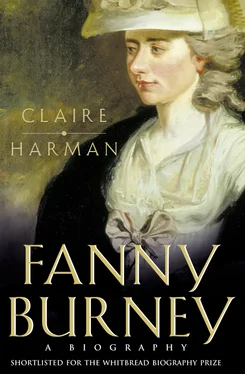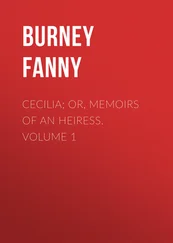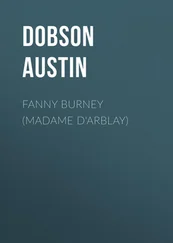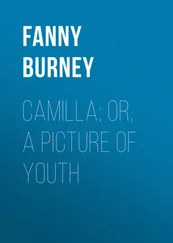Nevertheless, in the summer of 1776, when Dr and Mrs Burney had gone to Bristol and Fanny was left to her own devices with only the toddler Sally and the servants for company, she settled down with a hitherto unknown single-mindedness and wrote most of what is now Evelina ’s second volume. By the end of the year she was beginning to negotiate with publishers.
The step from indulging in private ‘vagaries’ to producing two volumes of a full-length novel and soliciting its publication is so momentous that we may well wonder what prompted Fanny Burney to take it, or even think of it. The reason given in the Memoirs does not sound like the whole truth:
When the little narrative, however slowly, from the impediments that always annoy what requires secrecy, began to assume a ‘questionable shape;’ a wish – as vague, at first, as it was fantastic – crossed the brain of the writer, to ‘see her work in print.’ 8
This makes it sound as if Burney was simply indulging ‘a taste for quaint sports’ 9 in a frivolous and ladylike fashion. She certainly could not have thought of openly adopting a career as a novelist in 1776 – for a middle-class woman it was simply not respectable – but anonymous publication was a possibility. Her knowledge of the printing trade made the business of soliciting publication less intimidating than it might otherwise have been, but when Joyce Hemlow says that ‘the practice (almost the habit) of book-making that she had known for the last five years in her father’s study must have been sufficient by the momentum of its progress to carry her on to the press’, 10 she makes the publication of Evelina sound rather too much like a demonstration of Newton’s second law. Fanny’s sudden decision to finish and publish her novel seems to have been triggered by something more urgent and personal.
It is possible that something happened in the Burney family in 1776 that made it desirable or even necessary for Fanny to make some money quickly by hurrying into print. We are unlikely to find out what this might have been; Fanny burned her whole diary and most of her correspondence for that year and the next, noting in her papers that the material was ‘upon Family matters or anecdotes’ – as if that was sufficient to justify it being ‘destroyed […] in totality’. 11 But two years later, when she was accused by Mrs Thrale of having courted the attention she seemed to despise by soliciting publication, she said, ‘My printing it, indeed […] tells terribly against me, to all who are unacquainted with the circumstances that belonged to it.’ 12 This reveals that there were ‘circumstances’ that forced Fanny to act against her inclination and publish.
Neither of the two family scandals that took place in the autumn of 1777 can completely account for the move. The first was the elopement of Mrs Burney’s third child, Bessy Allen, who had been sent to Paris in 1775 for the improvement of her manners. Charlotte Burney, who was the same age as Bessy, was not sent with her as a companion; presumably they did not get on well. Mrs Burney was proud of her daughter and had intended, in Samuel Johnson’s opinion, ‘to enjoy the triumph of her superiority’ over the Burney girls. 13 In August 1777 she had gone to Paris to bring Bessy home when the girl, sensing an end to her freedom, eloped with an adventurer called Samuel Meeke, a man reputed to be ‘Bankrupt in fame as well as Fortune’. 14 The couple were married two months later in exactly the same place, Ypres, where Maria had married Martin Rishton. Mrs Burney had to return home on her own, shocked, anxious, ashamed and chagrined to the quick. *
The family had hardly recovered from this first shock when another disgrace hit the Burney household. Charles Burney junior had gone up to Caius College, Cambridge, in January 1777. Though he was fond of pranks, and lighthearted to the point of being feckless, Charles had a zeal for scholarship and an intellectual ability that outshone that of anyone else in the family. At Cambridge he was admitted to the University Library as a special privilege (it was not normally used by undergraduates at this date), but when a surprising number of classical texts began to go missing soon after his arrival, suspicion fell on him. The Under-Librarian decided to search his rooms secretly, an operation which had to be attempted during dinner since, as the College Bedmaker said, that was the only time Burney could be relied on not to be studying. 16 ‘In a dark Corner’ they found about thirty-five of the missing volumes, mostly sixteenth- and seventeenth-century editions of the standard classical authors, which had had the university arms removed from them and the Burney bookplate substituted. Other volumes, as it turned out, had been sold on, and when young Burney fled Cambridge after the discovery of his crime, a further box of stolen books was sent back to the library from London. In his few months at the university, he must have been stealing books almost all the time.
The shock at home was seismic, and none felt it more violently than the Doctor, who refused to see his son. Fanny’s diary from this painful period has not survived, nor has Charles Burney’s correspondence on the subject with his friend Thomas Twining, though Twining’s replies indicate how much comforting and bringing to reason the bitterly disappointed father required. 17 At one point Charles seems to have considered disowning his son altogether, and he certainly thought of making him change his surname. Fortunately, when the first shock subsided, he dropped these drastic ideas. The problem of what to do with the reprobate remained, however. Charles junior was sent into exile to the village of Shinfield in Berkshire, presumably to a private tutor, from where he communicated forlornly with his sisters in St Martin’s Street.
But young Charles’s was not a brooding nature, and he recovered far quicker from this shameful episode than did the rest of his family. By the following spring he had been found a place at King’s College, Old Aberdeen – a far cry from Caius, and in a Presbyterian country (which his father thought might be a further hindrance to his taking Holy Orders, as they still hoped he would some day). He was writing verses, such as ‘Farewell to Shinfield’, which indicate that his spirits were pretty well restored:
Let me shake off the rustic – & once more
The gayer joys of college life explore. 18
The ‘gayer joys’ in question may well have been what got him into trouble in his short Cambridge career, where any kind of high living would have very rapidly used up young Charles’s small allowance. Ralph S. Walker, in his article on the thefts, 19 points out that when Charles junior’s own son, Charles Parr Burney, was going up to Oxford, he warned him feelingly of ‘three stumbling blocks: Gaming, Drinking and the Fair Sex’, the greatest being gaming: ‘Its fascinations are matchless and when they once influence the mind, their power is uncontrollable’. 20 This is surely the voice of experience, and perhaps young Charles did steal and sell the books in order to avoid owning up to debt at home.
Fanny puts a different slant on the matter in a letter written many years later to Charles Parr Burney (who had only just found out about the episode), in which she states ‘the origin of that fatal deed to have been a MAD RAGE for possessing a library, and that the subsequent sale only occurred from the fear of discovery’. 21 Charles’s bibliomania, which far surpassed his father’s, resulted in him possessing at the time of his death in 1817 one of the most splendid private libraries of the age, which, along with his magpie hoards of old newspaper cuttings (ninety-four volumes) and an extensive archive of material relating to the history of the stage, formed a core collection of the new British Library. Fanny’s suggestion that her brother suffered a pathological ‘rage for possessing a library’ seems psychologically convincing. In the days of his prosperity, he acquired books conventionally; when he was a student from the lower bourgeoisie, let loose in the treasure-house of a university library, he just acquired them anyway.
Читать дальше












